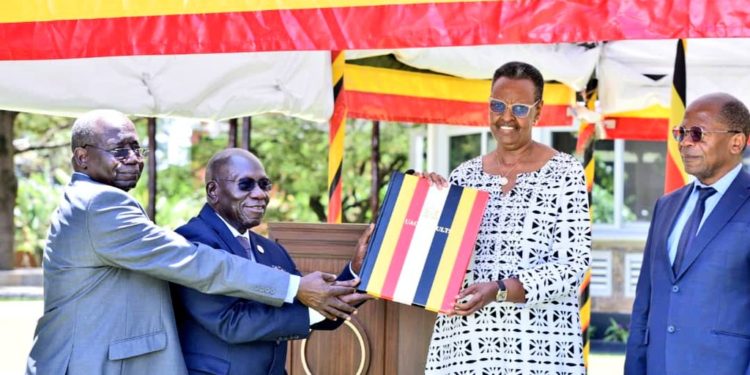By CHIMPREPORTS
The Minister of Education and Sports and First Lady, Janet Museveni, has released the Examen Results of the Uganda Advanced Certificate of Education (UACE) 2023.
An analysis of the overall candidates’ performance shows that a very high percentage of candidates (99.1%) qualified for the award of the UACE, just as was the case in 2022.
Although 99.1% of candidates qualified for UACE certificate, the Uganda National Examinations Board (UNEB) Executive Director, Dan Odongo, revealed that only 73.7% of the candidates qualified for a university degree admission.
Under the current regulations, a candidate requires a Subsidiary level pass in a Principal level subject to qualify for a university admission.
“University admissions to degree courses have, up to date, been considering 2 Principal level passes as the minimum requirement. If this consideration is maintained, 80,643 (73.7%) qualify to be admitted, compared to 67,815 (70.3%) in 2022. This is consistent with the fact that there was better overall performance and a significant increase in entries for the examination in 2023,” said Odongo.
In cases, where a Principal and two Subsidiary passes levels are considered for admission to other tertiary institutions, 90.7% of the candidates will qualify. This is better when compared to 2022 with 89.3%.
TOTAL CANDIDATURE
A total of 110,553 candidates registered for the 2023 UACE examination from 2,102 centres compared to 97,890 candidates from 1,969 centres in 2022. This is an increase of 12,663 candidates (12.9%).
Of these, 47,226 (42.7%) were females and 63,339 (57.3%) were males. Candidates who appeared for the examination were 109,488, compared to 96,557 in 2022, an increase of 12,931 candidates (13.4%). Of these, 46,860 (42.8%) were females and 62,628 (57.2%) were males. At this level, the number of female candidates has consistently been much lower than that of the males.
The number of candidates registered under the Universal Post O’Level Education and Training (UPOLET) programme was 24,679, (22.3%) of the total candidature compared to 17,321 (17.7%) in 2022.
Of the candidates registered under the UPOLET programme, 16,008 (14.5%) of the total candidature were males and only 8,671 (7.8%) were females. The greater number of students at UACE are not under the Universal education programme, much less, the females. This may be related to the types of schools that offer UACE.
The total number of Special Needs Education (SNE) candidates were 358 as compared to 222 in 2022.
“The pass rate among the SNE candidates was 92.7% compared to 99.1% of the other candidates. Three candidates (1 male and 2 females) did not appear for the examination,” said Odongo.
Luzira Upper Prison registered 34 inmates (30 males and 4 females). All the candidates sat the examination, and all 34 candidates qualified for the award of the UACE certificate.
PERFORMANCE OF CANDIDATES
Although female candidates are fewer in number than the male candidates, proportionally, they performed better than their male counterparts did. The percentage passes at the upper levels (3P and 2P) are higher, while percentage passes at the lower levels and failure rate among female candidates are lower than for the males.
“This has been the observed trend in the last three years,” said Odongo.
At the Principal pass level (AE), there are improvements in Entrepreneurship Education, Christian Religious Education, Geography, Literature in English, Agriculture, Chemistry, Biology and Art.
Odongo said the numbers of candidates registering and appearing for Mathematics and the Sciences are gradually increasing, with Mathematics showing the greatest promise.
However, overall, the numbers have remained well below half of the total candidature.
“This is consistent with the fact that pass rates in these subjects in the Uganda Certificate of Education (UCE) examination have also been low, impacting transition to UACE.”
Proportionally, female candidates performed better than their male counterparts at the principal level pass (A-E) in all the subjects except in Agriculture, Chemistry and Biology. They also performed better in Subsidiary Mathematics.
Female entries for the Sciences and Mathematics have remained lower than that of the males, consistent with the fact that overall female entry is lower than that of the males.







Discussion about this post